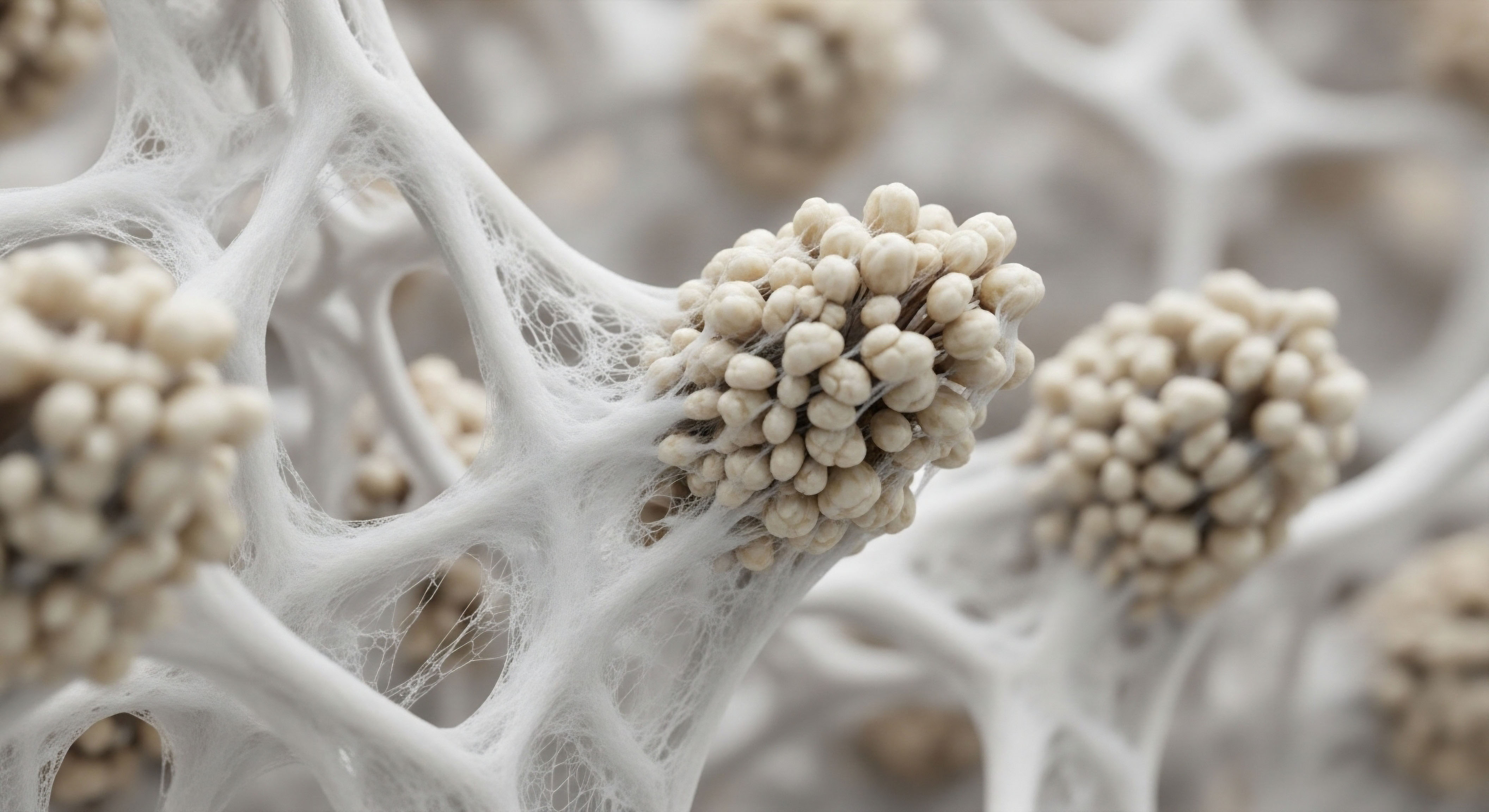

Fundamentals
You have likely experienced those moments when mental sharpness feels diminished, when recall requires greater effort, or when emotional equilibrium wavers without an apparent external cause. This personal perception of altered cognitive function or shifting emotional states is a valid signal from your internal systems. Such experiences often point to dynamic processes within your endocrine architecture, particularly how your hormones communicate with your brain. Understanding these biological conversations offers a path to reclaiming cerebral vitality and overall well-being.
The endocrine system, a sophisticated network of glands, produces chemical messengers known as hormones. These hormones circulate throughout the body, influencing virtually every cell, tissue, and organ. Within the brain, these chemical messengers act as powerful modulators, shaping neural development, synaptic function, and overall cognitive processing. A well-regulated hormonal milieu supports optimal brain health, whereas imbalances can contribute to a range of symptoms, including alterations in mood, memory, and mental acuity.
Neuroprotection involves safeguarding the brain’s cells and networks from damage and degeneration. It represents a continuous effort by the body to maintain the structural integrity and functional capacity of the nervous system. Hormonal balance significantly contributes to this protective process, influencing neuronal survival, reducing oxidative stress, and mitigating inflammatory responses within the central nervous system. Lifestyle interventions play a profound role in supporting these intrinsic protective mechanisms.
Optimal hormonal balance profoundly influences the brain’s ability to protect itself from cellular damage and maintain cognitive function.

How Hormones Influence Brain Function?
Hormones exert their influence through specific receptors located on neuronal and glial cells throughout the brain. For instance, sex steroids, including testosterone and estrogen, cross the blood-brain barrier and engage with receptors in regions vital for memory, learning, and mood regulation, such as the hippocampus and prefrontal cortex. These interactions modulate neurotransmitter systems, synaptic plasticity, and neuronal excitability, directly impacting cognitive performance. Progesterone also exhibits significant neuroprotective properties, supporting neuronal repair and reducing inflammation.
Consider the Hypothalamic-Pituitary-Gonadal (HPG) axis, a central regulatory system. This axis represents a continuous dialogue between the brain and the gonads, directing the production of sex hormones. When this intricate system operates in equilibrium, it supports a cascade of beneficial effects throughout the body, including those that safeguard brain health. Disruptions in this axis, often observed with aging or specific health conditions, can lead to hormonal insufficiencies that compromise neurocognitive resilience.

The Endocrine System’s Role in Neural Health
The endocrine system acts as a master regulator of various physiological processes, including those that directly impact neural health. Hormones orchestrate energy metabolism, stress responses, and inflammatory pathways, all of which hold direct implications for brain vitality. Thyroid hormones, for example, are essential for neuronal differentiation and myelination. Cortisol, a stress hormone, acutely supports brain function, but chronic elevation can compromise hippocampal integrity and cognitive performance. Maintaining equilibrium across these systems establishes a foundation for robust neuroprotection.


Intermediate
Moving beyond foundational concepts, we consider the clinical protocols that actively restore hormonal balance, alongside lifestyle strategies that amplify their neuroprotective reach. This approach acknowledges that while targeted biochemical recalibration offers substantial benefits, its full potential unfolds when integrated with conscious daily practices. The synergy between external support and internal optimization provides a comprehensive strategy for enhancing brain resilience.

Targeted Hormonal Optimization Protocols
Hormonal optimization protocols aim to restore physiological hormone levels, addressing deficiencies that compromise systemic function, including brain health. These protocols involve precise administration of bioidentical hormones or peptides, tailored to individual needs.
- Testosterone Replacement Therapy (TRT) for Men ∞ Men experiencing symptoms of low testosterone, such as diminished cognitive function or reduced mental energy, often benefit from TRT. A standard protocol may involve weekly intramuscular injections of Testosterone Cypionate, typically 200mg/ml. Concurrently, Gonadorelin is administered subcutaneously twice weekly to maintain endogenous testosterone production and fertility. Anastrozole, an oral tablet taken twice weekly, helps manage estrogen conversion, reducing potential side effects. Enclomiphene may also be included to support luteinizing hormone (LH) and follicle-stimulating hormone (FSH) levels, further supporting testicular function. Optimized testosterone levels have shown associations with improved cognitive performance and reduced markers of neurodegeneration.
- Testosterone Optimization for Women ∞ Women navigating pre-menopausal, peri-menopausal, or post-menopausal transitions often experience symptoms such as irregular cycles, mood shifts, or reduced libido. Testosterone Cypionate, administered via subcutaneous injection (typically 10 ∞ 20 units weekly), can address these concerns. Progesterone is prescribed based on menopausal status, playing a critical role in hormonal balance and exhibiting neuroprotective effects. Pellet therapy, offering long-acting testosterone, with Anastrozole when appropriate, presents an additional option for sustained hormonal support.
- Growth Hormone Peptide Therapy ∞ For active adults and athletes seeking anti-aging benefits, muscle gain, fat loss, and sleep enhancement, specific peptides offer targeted support. Peptides such as Sermorelin, Ipamorelin/CJC-1295, Tesamorelin, Hexarelin, and MK-677 stimulate the body’s natural production of growth hormone. These agents contribute to cellular repair, metabolic regulation, and neurocognitive support, impacting memory and neural tissue health.
- Other Targeted Peptides ∞ PT-141 supports sexual health. Pentadeca Arginate (PDA) facilitates tissue repair, healing processes, and inflammation modulation, contributing to overall systemic recovery that indirectly supports brain health.
Strategic hormonal and peptide therapies, carefully tailored to individual needs, provide a direct pathway to restoring physiological balance and enhancing neuroprotection.

Lifestyle Interventions Amplifying Neuroprotection
Lifestyle interventions act as powerful co-factors, augmenting the neuroprotective effects of hormone optimization. These practices influence cellular health, metabolic function, and systemic inflammation, creating an environment conducive to brain resilience.
| Lifestyle Domain | Mechanistic Link to Neuroprotection | Enhancement of Hormone Therapy |
|---|---|---|
| Nutrition | Provides substrates for neurotransmitter synthesis, reduces oxidative stress, modulates inflammation. | Supports metabolic pathways influenced by hormones, optimizes receptor sensitivity. |
| Physical Activity | Increases brain-derived neurotrophic factor (BDNF), improves cerebral blood flow, reduces neuroinflammation. | Amplifies neurotrophic signaling, supports cardiovascular health essential for hormone delivery. |
| Sleep Quality | Facilitates glymphatic clearance of metabolic waste, consolidates memory, regulates stress hormones. | Optimizes hormone synthesis and rhythm, reduces cortisol-induced neural stress. |
| Stress Management | Modulates the hypothalamic-pituitary-adrenal (HPA) axis, reduces chronic cortisol exposure. | Preserves HPG axis integrity, prevents stress-induced hormonal dysregulation. |
Engaging in regular physical activity, for instance, directly stimulates the production of neurotrophic factors, such as brain-derived neurotrophic factor (BDNF), which are crucial for neuronal survival and plasticity. This effect complements the neurotrophic support offered by optimized hormone levels. A diet rich in antioxidants and healthy fats supports mitochondrial function and reduces systemic inflammation, which directly correlates with improved brain health and the efficacy of hormonal protocols.
Adequate sleep quality orchestrates hormonal rhythms and facilitates the brain’s waste clearance systems. Chronic sleep deprivation disrupts cortisol patterns and impairs neurocognitive function, undermining the benefits of any hormonal optimization strategy. Mindful stress management techniques also temper the HPA axis, preventing cortisol overexposure that can degrade neural networks over time. These integrated approaches create a powerful feedback loop, where optimized hormones enable greater physical and mental capacity, and improved lifestyle choices, in turn, reinforce hormonal balance and brain health.


Academic
A deeper exploration reveals that lifestyle interventions and hormone optimization protocols converge at the molecular and cellular levels, establishing a robust defense against neurodegeneration. This synergy operates through intricate crosstalk between endocrine signaling, cellular bioenergetics, and immune modulation within the central nervous system. Understanding these underlying mechanisms offers a comprehensive view of how personalized wellness protocols fortify neurocognitive resilience.

How Does Metabolic Homeostasis Influence Neuroprotection?
Metabolic homeostasis, a state of physiological balance in energy regulation, profoundly impacts brain health. Optimized hormonal states, such as those achieved through testosterone or estrogen optimization, influence systemic insulin sensitivity and glucose metabolism. Neurons rely heavily on a consistent supply of glucose for ATP production, which fuels synaptic transmission and maintains cellular integrity. Dysregulation of glucose metabolism, often seen in metabolic syndrome or insulin resistance, correlates with impaired neuronal function and increased vulnerability to neurodegenerative processes.
Lifestyle interventions, including targeted nutrition and regular physical activity, directly enhance metabolic efficiency. For example, caloric restriction and ketogenic diets can shift brain metabolism towards ketone body utilization, providing an alternative, often more efficient, fuel source for neurons. This metabolic flexibility supports mitochondrial function, the primary site of ATP generation, and reduces oxidative stress within neural cells.
Hormones such as thyroid hormones and growth hormone peptides also play direct roles in mitochondrial biogenesis and function, illustrating a direct convergence with lifestyle strategies.
Metabolic balance, supported by both optimized hormones and strategic lifestyle choices, fuels neuronal vitality and enhances the brain’s intrinsic protective capacities.

The Interplay of Hormones, Inflammation, and Neurotrophic Factors
Chronic low-grade inflammation within the brain, termed neuroinflammation, contributes significantly to neuronal damage and cognitive decline. Microglial cells, the brain’s resident immune cells, transition from a protective to a pro-inflammatory state under chronic stress or metabolic dysregulation. This shift compromises the blood-brain barrier and releases cytotoxic molecules, damaging neural networks.
Hormones exert significant anti-inflammatory and immunomodulatory effects. Estrogens, for instance, mitigate microglial activation and reduce the production of pro-inflammatory cytokines, preserving neuronal integrity. Progesterone also demonstrates anti-inflammatory actions, supporting recovery following neural injury. Optimized testosterone levels contribute to reducing systemic inflammation, which has downstream benefits for the brain. Lifestyle interventions directly complement these hormonal actions.
- Dietary Modulation ∞ Anti-inflammatory diets, rich in omega-3 fatty acids and antioxidants, directly suppress inflammasome activation and support the resolution of neuroinflammation.
- Physical Movement ∞ Regular exercise reduces systemic inflammatory markers and promotes the release of myokines that cross the blood-brain barrier, exerting anti-inflammatory effects within the brain.
- Sleep Regulation ∞ Adequate, restorative sleep facilitates the glymphatic system’s clearance of inflammatory byproducts and metabolic waste from the brain, preventing their accumulation.
Furthermore, the combined influence of optimized hormones and lifestyle practices significantly upregulates neurotrophic factors, particularly brain-derived neurotrophic factor (BDNF). BDNF is a protein essential for neuronal survival, growth, differentiation, and synaptic plasticity. It promotes neurogenesis, the creation of new neurons, particularly in the hippocampus, a region vital for learning and memory.
Exercise is a potent stimulus for BDNF production, and this effect is further supported by a balanced hormonal environment, creating a powerful synergy for cognitive resilience. Hormonal optimization, therefore, establishes a receptive physiological state, allowing lifestyle interventions to exert their maximal neuroprotective influence by directly modulating cellular energetics, immune responses, and neurotrophic signaling pathways.
| Mechanism | Hormone Optimization Contribution | Lifestyle Intervention Contribution |
|---|---|---|
| Mitochondrial Bioenergetics | Direct influence on ATP production, improved substrate utilization, antioxidant defense. | Enhanced mitochondrial biogenesis (exercise), metabolic flexibility (nutrition), reduced oxidative stress. |
| Neuroinflammation Modulation | Suppression of microglial activation, reduction of pro-inflammatory cytokines, blood-brain barrier integrity. | Anti-inflammatory diet, systemic inflammation reduction (exercise), waste clearance (sleep). |
| Synaptic Plasticity & Neurogenesis | Upregulation of neurotrophic factors, support for neuronal growth and differentiation. | Direct stimulation of BDNF, enhanced synaptogenesis (exercise, cognitive engagement). |

References
- Białek, M. Zaremba, P. & K. Kinga. “Neuroprotective role of testosterone in the nervous system.” Polish Journal of Pharmacology, vol. 56, no. 5, 2004, pp. 509-18.
- Singh, Meharvan, et al. “Brain-derived neuerotrophic factor and related mechanisms that mediate and influence progesterone-induced neuroprotection.” Frontiers in Endocrinology, 25 Feb. 2024.
- “Neuroprotective effect of hormone replacement therapy ∞ a review of the literature.” Climacteric, vol. 27, no. 4, Aug. 2024, pp. 351-356.
- “An Updated Review ∞ Androgens and Cognitive Impairment in Older Men.” Frontiers, 12 Nov. 2020.
- “Growth Hormone Improves Cognitive Function After Experimental Stroke.” Stroke, 10 Apr. 2018.
- “Molecular mechanisms underlying physical exercise-induced brain BDNF overproduction.” PMC – PubMed Central. (No author or specific journal/date provided in snippet, listed by title and platform.)
- “Editorial ∞ The Metabolic-Inflammatory Axis in Brain Aging and Neurodegeneration.” Frontiers. (No author or specific date provided in snippet, listed by title and platform.)
- Endocrine Society. “Treatment of Symptoms of the Menopause ∞ An Endocrine Society Clinical Practice Guideline.” The Journal of Clinical Endocrinology & Metabolism, 7 Oct. 2015.

Reflection
Your personal health journey represents a unique biological narrative, one shaped by the intricate interplay of your endocrine system, metabolic function, and daily habits. The knowledge presented here offers a framework for understanding these connections, moving beyond a passive acceptance of symptoms toward a proactive stance in reclaiming vitality.
Consider this information a starting point, a scientific lens through which to view your own experiences. A truly personalized path to wellness necessitates individualized guidance, translating these broad principles into protocols tailored to your specific biological blueprint. Your capacity to influence your health is profound, beginning with informed self-awareness and purposeful action.



